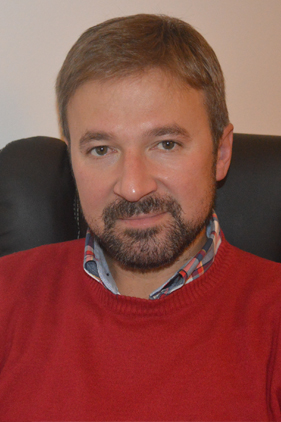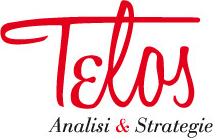November 2016, Year VIII, no. 11
Renato Ladeiro
The second (or third) life of the Ape-car
“It’s a déjà-vu, it happens every time an innovative product/service breaks onto the market. In the early days of any novelty there are no rules regulating the activity and the innovative idea functions in a context we could call extra-legem”
Telos: Tuk-tuks in Portugal. Where did you get this innovative idea to provide a new service to tourists?
Renato Ladeiro: In 2002 I was in Thailand on a business trip. One day in Bangkok I saw so many auto rickshaws I decided to take one instead of a taxi (when in Rome do as the Romans do!). Tuk-tuk, taxi, another tuk-tuk... this is all you see when you walk around noisy, chaotic Bangkok. I love Bangkok, I love the feeling of freedom it gives me and I adore its controlled chaos. Tuk-tuks are the backbone of this chaos. There are tuk-tuks galore. I was so bowled over by all these tuk-tuks that when I got home and an ape-car shot by me I felt like negotiating the price of a ride with the driver.
A few years later I had a brainwave: I realised that tuk-tuks could be a successful means of transport even in Europe. I swapped ideas with a few friends in Thailand with whom I’d stayed in contact and decided to import the modern Thai version of the traditional rickshaw into Portugal. I started my business in Coimbra, that’s where I was living when this adventure begun on a hot Thursday in July 2010. I wasn’t behind the launch of tuk-tuks in Lisbon, even though in 2011 I’d met the Mayor who, however, didn’t show the slightest bit of interest or willingness to allow this kind of vehicle in the city. At the time I couldn’t foresee what would happen later - a bona fide invasion of auto rickshaws in Lisbon! Actually, for many people it was a plague. So, if you’re not headed for Bangkok, why not think about taking a tuk-tuk in Portugal?
For tourists, the tuk-tuk experience is not necessarily about the quickest and cheapest way to get from Point A to Point B, it’s all about enjoying the ride through a scenic city. How does the service work?
When I started my business my goal was - and still is - to give my passengers a cultural tour of the city, taking them round the streets, neighbourhoods and steep, winding alleys that are so typical in Portugal. I wanted them to ride in a “fun” vehicle and enjoy the panorama from places such as the city’s terraces that can’t be accessed by the vehicles normally used by tourists, for example coaches. Our clients can also choose different routes, depending on their tastes, preferences and the time they have available. People have reacted enthusiastically. We offer set tours, but if anyone has special requirements or has already made their own itinerary we can also arrange personalised tuk-tuk tours, totally and completely decided by the client. Let me give you some examples of people’s comments about our tours: ‘we had an absolutely fab time with the guide and tuk-tuk. We recommend it to everyone! ☺ it’s cheap and if it’s your first time to Lisbon it’s the best way to get to know the city and its history’, or ‘great way to tour Portuguese cities and their steep, narrow little streets, because tuk-tuks go where other vehicles can’t. And they even have seat belts!’ That made me smile because I consider my passengers’ safety as paramount and the fact people think they’re safe is a great achievement.
Innovative ideas and regulations do not always go hand in hand. Uber’s experience in Europe is an example. Lisbon’s mayor, Fernando Medina, announced restrictions on tuk-tuks that will limit the hours in which they can operate and the places where they can park. The new rules will even make some streets off limits for tuk-tuks, as well as require them to run on electric engines by 2017. What happened?
The market grew so quickly, especially in Lisbon! I think the tuk-tuk boom was due to the fact that more and more people are visiting the city, it’s one of the favourite tourist destinations in Europe. Secondly, tuk-tuks are an excellent job opportunity for anyone unemployed who wants to start his own business. But we do need a coherent, unambiguous set of rules!
It’s a déjà-vu, it happens every time an innovative product/service breaks onto the market. In the early days of any novelty there are no rules regulating the activity and the innovative idea functions in a context we could call extra-legem. We’re talking here about tuk-tuks, but we could apply the same logic to many other sectors: the hotel sector - with Airbnb - urban transportation - with Uber - and many other start-ups tailored for consumers and developed based on the insight of an individual or company research department. They find themselves at a disadvantage and have to adapt to the initial context without ad hoc rules and deal with all the difficulties this entails. It’s normal for innovation to be a step ahead of regulations; what’s important is that the authorities must be ready and willing to listen to all the stakeholders and quickly adopt a framework of unambiguous rules taking account of all stakeholders’ positions. I agree that the use of auto rickshaws should be limited during the night; it’s only right that the inhabitants of inner city neighbourhoods be able to enjoy a peaceful night, especially because during the day the streets in question are overrun with tuk-tuks. I also agree with the rule regarding electric vehicles, especially when you think of the average atmospheric and acoustic pollution produced by auto rickshaws. Nevertheless, I think it’s an escamotage to discourage tuk-tuks in the city, because to remain on the market operators in this sector will be forced to invest resources that in some cases they might not have. One last thing. I agree that if tuk-tuk drivers also want to be guides then they have to be properly trained. It’s really shocking that some of them go around telling unfortunate tourists that the bridge over the Tago is called April 25 Bridge because it was inaugurated on 25 April 1974. It shows that not all drivers can do this job (editor’s note: the bridge was originally called Salazar Bridge because it was commissioned by António de Oliveira Salazar in 1960. The name was changed after democracy was restored in Portugal thanks to the carnation revolution that took place on 25 April 1974).
You were the first to set up a tuk-tuk tour operator company, but your idea was immediately copied. How is the fight for your trademark going? And are you planning to develop your company?
That’s true. In Portugal I was the first to launch this activity, even though someone who arrived later - a good two years later - says he was the first! What can I say? My idea began to be copied in 2012. No-one knows - or bothered to find out - that TUK TUK® is a brand I registered it in Portugal. Up to now 43 operators have been accused of violating my brand and there’ve been numerous appeals against verdicts which, in my opinion, did not protect my intellectual property rights. Given the situation and the fact I wanted to get a better grasp of the situation I began to review documents and study Intellectual Property Laws. This led to me being invited to become a member of the association for the protection of intellectual property rights. I can’t tell you how frustrated I was, but to use and American expression, inside every problem lies an opportunity. In fact in the last few years I didn’t only play a defensive game; after a while I developed other projects which we’ll soon launch on the road. Last year I established e-Quad Vehicles® in order to get ahead of the now saturated market of auto rickshaws as well as respect the new regulations that require tourists to be transported by electric vehicles. These e-Quad vehicles include golf carts and other electric vehicles, all ideal vehicles to transport people inside hotels, resorts, hospitals, companies, golf courses and obviously city tours. To date e-Quad Vehicles® is present not only on the Portuguese market, but also in Spain, Capo Verde, Mozambique, Morocco, Austria, the United Kingdom and Switzerland - and who knows that in the future we may expand and innovate even further.
Editorial
The horse-drawn cart is one of the most famous iconographic symbols of Sicilian folklore: first used as a means of transport, thanks to the decorations portraying moments in the history of the island, popular epics or religious stories it has evolved into a vehicle to transmit culture. When the Sicilians realised they had to find a modern version of the cart they shifted to the Ape-car, but didn’t forget to continue the decorations tradition and turn the lapa (the Sicilian dialect word that indicates the Ape-car) into a genuine, roving work of art (a mythical, wobbly lapa azzura was used by Nanni Moretti, in the film Caro Diario, during his tragicomic journey amongst the gentle hills, donkeys and cacti in the Aeolian islands). It’s exciting to discover that a vehicle, produced by Piaggio since 1948 and considered iconic by Italians, is now returning to Europe from its exile in Asia as an innovative tuk-tuk service. We’ve been told the story of this retour d’Asie by a brilliant young Portuguese entrepreneur, Renato Ladeiro, owner of the TUK TUK® brand. His words betray his immeasurable enthusiasm, but also the frustration he feels due to all the difficulties he encounters to try and make people understand and accept a new and different way of providing a service to tourists. Ultimately his idea isn’t anything out of the ordinary, but nevertheless he has come up against, and continues to come up against endless problems. So many that anyone less stubborn or strong would have thrown in the towel a long time go. Ladeiro admits that rules are necessary, in fact he even demands them. But he criticises rules that are pointlessly penalising and do not protect the community. He suspects that some rules are only an elegant way to stop the growth, albeit regulated growth, of an innovative service. We have to admit that from such a down-to-earth and certainly unsophisticated person as Ladeiro we would never expected such a clear-headed analysis of innovation and regulations. Enforcing traditional rules deters innovation and economic growth; extending old rules to any novelty kills it completely. Clearly contrasting needs do exist, and the job of lobbyists (not facilitators please!) is now more than ever to bring this kind of problem to the attention of the authorities. We firmly believe that the solution is not to enter the market using a studs-up tackle or by flouting the law simply using the excuse that you’re right and the law is obsolete. This is often true, but the way to overcome diffidence is to remain calm, to work meticulously and often quite slowly in order to achieve cultural growth. So that everyone’s interests are taken into account, rather than those of a select few. This is how change and innovation can be implemented. With conviction and not strong-arm tactics. Thanks to Ladeiro, today we can bring to your attention this issue.

Renato Ladeiro is a classic example of a self-made man. Born in the city of Figueira da Foz (Portugal) in 1975, he trained in the Air Force where he attended the Air Traffic Controller course. But the future had something else in store for him! When he was 23 he decided to leave everything behind and go where the wind would take him! That same year he began to work as a Steward for an American Cruise Line company. Five years later he decided his cruise ship career was over and became an Assistant Manager in the Food & Beverage sector. In 2004 he began working as maître d’hotel in the river cruise segment in Europe. In 2007, after visiting 59 countries since the start of his odissey on cruise ships he settled in the historical city of Coimbra, 50 Kms away from his hometown. Since then he has been running a river boat service on the Mondego river. In 2010, thanks to his experience abroad, he imported the first Thai auto rickshaw to Portugal with a view to using them as vehicles for sightseeing tours; he was the first to pioneer and expand this business in the country. That same year he registered the TUK TUK® brand in Portugal. Since 2015 he has also been an Intellectual Property consultant specialising in registered brands and trademarks. He is a consultant for new opportunities in the tourism business and also runs his own Low Speed Electrical Vehicles business. Last but not least, he also runs an e-commerce company for tools and machinery.







SocialTelos